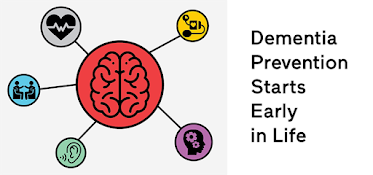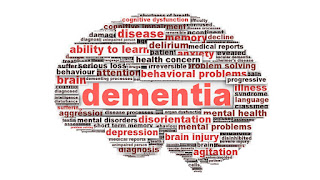What Is the Main Cause Of Dementia? | 13 Life Style Factors that Prevent Dementia
Dementia comes in many different forms. Loss of memory, issues with thinking and reasoning, and the incapacity to conduct independent jobs and daily activities are the hallmarks of dementia. Although Alzheimer's disease is the most prevalent form of dementia, the vascular disease accounts for up to a third of cases, including some in which Alzheimer's has been identified. The good news is that dementia risk can be decreased.
What are the Risk Factors?
A risk factor is something that might make a disease more likely to manifest. While certain risk factors are under our control, others are not. For instance, a person cannot control their age, which is the biggest risk factor for dementia like Alzheimer's and others. Genes are another unpredictable risk factor. The components in our body's cells known as genes are inherited from our parents at birth. Even minor gene alterations can result in illnesses. Other characteristics that affect risk include race and gender. According to research, dementia is more common in Black Americans, American Indians, and Alaska Natives, and different risk factors may apply to men and women. What causes these discrepancies is being looked upon by researchers.
People may regulate their behavior and lifestyle, which can affect how likely they are to get certain diseases. For instance, a significant risk factor for heart disease is excessive blood pressure. Changing one's lifestyle or using medication to lower blood pressure can help lower the chance of developing heart disease and having a heart attack. Researchers initially carry out observational studies to draw links before determining which risk variables may be able to avoid an illness or condition. Then they carry out meticulously monitored clinical studies. For instance, after establishing a link between high blood pressure and heart attacks, researchers carried out clinical studies to show that reducing blood pressure does, in fact, reduce the risk of suffering a heart attack.
That being said, lowering blood pressure does not guarantee that a person won't experience a heart attack. Nonetheless, it greatly reduces the likelihood. No behavior or lifestyle factor has advanced to the point that researchers can confidently state that it will prevent Alzheimer's and associated dementias. Nonetheless, there are hopeful paths.
How to Reduce Dementia Risk Factors?
The number of Americans over the age of 65 is growing, and as a result, more people will likely get dementia. Yet, other research indicates that dementia incidence rates defined as the number of new cases in a community over time have declined in various places, including the United States. According to observational research, things like leading a healthier lifestyle and having more knowledge may be causing this drop. Nevertheless, the relationship between the causes and effects is unclear, and to establish if such variables may stop dementia, clinical research would need to be conducted.
An analysis of previously published studies assessed the evidence from clinical trials on behavioral and lifestyle modifications to stop or slow the onset of Alzheimer's disease or age-related cognitive decline. For three behavioral modifications (called interventions) physical exercise, blood pressure regulation, and cognitive training the review revealed "encouraging but inconclusive" data. The results imply that these therapies are sufficiently promising that additional research should be done on them. To find out if, how much, or in what forms these therapies could prevent dementia, researchers are still investigating them.
13 Life Style Factors that Prevent Dementia.
There are a few ways individuals try to keep their brains healthy, such as eating well and exercising frequently. So you're in luck if you've been seeking extra strategies to keep your mind sharp. There are seven essential ways women in particular may reduce their chance of developing dementia as they age, according to recent research.

- Control High Blood Pressure: Lowering elevated blood pressure. Hypertension, or high blood pressure, harms the heart, blood vessels, and brain and raises the risk of a stroke and vascular dementia. Dementia risk may be lowered by managing high blood pressure with medication and other healthy lifestyle choices, such as exercising and giving up smoking.
- Control Your Blood Sugar: Diabetes can result from abnormally high blood sugar or glucose levels, which also raise the risk of heart disease, stroke, dementia, and cognitive decline. Blood sugar levels can be controlled by eating a balanced diet, exercising frequently, quitting smoking, and monitoring glucose levels.
- Keep a Healthy Weight: Obesity and being overweight raise the risk for other health issues including diabetes and heart disease. Maintaining a healthy weight can be aided by exercise and eating well.
- Adopt a Balanced Diet: Look for a variety of fruits and vegetables, whole grains, lean meats, and seafood, unsaturated fats like olive oil, and low-fat or nonfat dairy products, and avoid eating excessive amounts of additional fats and carbohydrates.
- Continue to be Active: Many health advantages of physical activity include lowering blood pressure, and preventing high blood pressure, obesity, heart disease, and stroke. Aim for 150 minutes or more of moderate-intensity exercise per week.
- Keep Your Mind Engaged: Reading, playing board games, and crafts, picking up a new hobby, learning a new skill, working or volunteering, and socialising are just a few of the things that may keep your mind engaged.
- Stay Connected With Family and Friends: Keep in touch with your loved ones and friends. The prevention of social isolation and loneliness, which are associated with increased risks for cognitive decline and Alzheimer's disease, can be accomplished through interacting with others and participating in social activities.
- Correct Hearing Issues: In older persons, hearing loss may have an impact on cognition, dementia risk, and social interaction. To help avoid hearing loss, keep loud noises away from your ears and wear hearing aids if necessary.
- Take Good Care of Both Your Physical and Mental Wellness: This includes undergoing the necessary tests for disease, managing long-term conditions like depression or high cholesterol, and keeping frequent check-ups with your doctor.
- Sleep Well: It's crucial to get enough sleep for your body and mind. Sleep for seven to eight hours every night. If you are having trouble falling or staying asleep or suspect you may have a sleep issue, consult your doctor.
- Avoid Head Trauma: Make your house fall-proof and wear shoes with full foot support and nonskid bottoms to reduce your risk of falling and suffering a head injury. Consider taking part in online or local fall prevention programs. To further safeguard yourself against concussions and other brain injuries, wear seatbelts and helmets.
- Drink Less Alcohol: Don't drink as much. Alcohol abuse can aggravate health issues including diabetes, high blood pressure, stroke, memory loss, and mood disorders as well as cause falls. Men should limit their alcohol consumption to no more than two drinks per day, while women should limit their intake to one, according to the National Institute on Alcohol Abuse and Alcoholism (NIAAA). Visit the Rethinking Drinking website to learn more.
- Quit Using Tobacco: You may improve your health and reduce your risk of heart attack, stroke, and lung disease at any age by quitting smoking.

Final Verdict:
As younger age mortality drops, the population of elderly individuals is growing, including those with dementia. Nonetheless, the prevalence of dementia in older people has decreased in many nations, most likely as a result of advancements in health care, nutrition, education, and lifestyle choices. The nine potentially modifiable risk factors for dementia intervention and care lower education, hypertension, hearing impairment, smoking, obesity, depression, physical inactivity, diabetes, and limited social contact are generally supported by expanding body of research. We now include three more dementia risk variables with stronger, more conclusive data.
These elements include air pollution, heavy alcohol use, and traumatic brain damage. We have updated the 12 risk factor life-course model of dementia prevention using the results of fresh reviews and meta-analyses. Almost 40% of dementia cases globally are caused by the 12 modifiable risk factors combined, which potentially might be avoided or postponed. Given the high prevalence of dementia in low- and middle-income countries (LMIC), there is great potential for prevention.
The implications for global policy of our new life-course model and evidence synthesis are enormous. For the purpose of preventing dementia, neither early life nor late life is ever too late. Early life risks, including having less schooling, have an impact on cognitive reserve. Midlife (45–65 years) and later life (over 65 years) risk factors have an impact on reserve and the initiation of neuropathological processes. The demand for change is mostly driven by culture, poverty, and inequality. The disadvantaged people will benefit the most from these improvements and are in the greatest need of them.


%20(1).png)



0 Comments